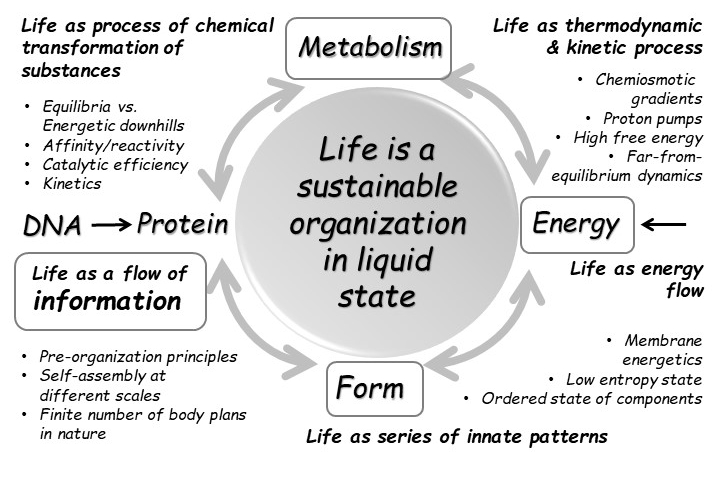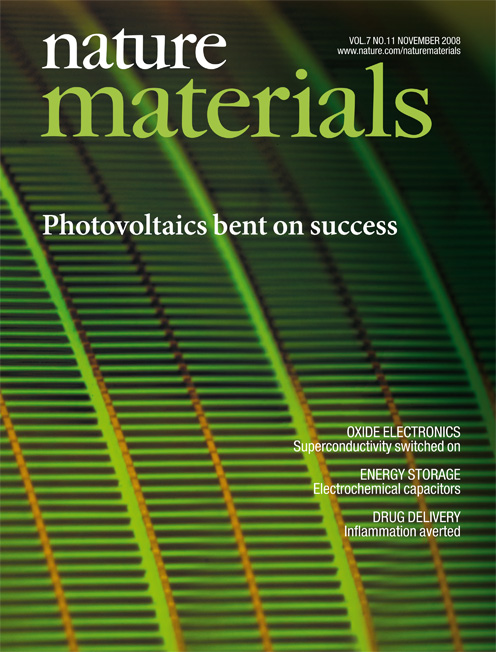|
Living Systems
Living systems are life forms (or, more colloquially known as living things) treated as a system. They are said to be open self-organizing and said to interact with their environment. These systems are maintained by flows of information, energy and matter. Multiple theories of living systems have been proposed. Such theories attempt to map general principles for how all living systems work. Context Some scientists have proposed in the last few decades that a general theory of living systems is required to explain the nature of life. Such a general theory would arise out of the ecological and biological sciences and attempt to map general principles for how all living systems work. Instead of examining phenomena by attempting to break things down into components, a general living systems theory explores phenomena in terms of dynamic patterns of the relationships of organisms with their environment. Theories Miller's open systems James Grier Miller's living systems theory ... [...More Info...] [...Related Items...] OR: [Wikipedia] [Google] [Baidu] |
Energy
Energy () is the physical quantity, quantitative physical property, property that is transferred to a physical body, body or to a physical system, recognizable in the performance of Work (thermodynamics), work and in the form of heat and light. Energy is a Conservation law, conserved quantity—the law of conservation of energy states that energy can be Energy transformation, converted in form, but not created or destroyed. The unit of measurement for energy in the International System of Units (SI) is the joule (J). Forms of energy include the kinetic energy of a moving object, the potential energy stored by an object (for instance due to its position in a Classical field theory, field), the elastic energy stored in a solid object, chemical energy associated with chemical reactions, the radiant energy carried by electromagnetic radiation, the internal energy contained within a thermodynamic system, and rest energy associated with an object's rest mass. These are not mutual ... [...More Info...] [...Related Items...] OR: [Wikipedia] [Google] [Baidu] |
Ecosystem
An ecosystem (or ecological system) is a system formed by Organism, organisms in interaction with their Biophysical environment, environment. The Biotic material, biotic and abiotic components are linked together through nutrient cycles and energy flows. Ecosystems are controlled by external and internal Environmental factor, factors. External factors—including climate—control the ecosystem's structure, but are not influenced by it. By contrast, internal factors control and are controlled by ecosystem processes; these include decomposition, the types of species present, root competition, shading, disturbance, and succession. While external factors generally determine which Resource (biology), resource inputs an ecosystem has, their availability within the ecosystem is controlled by internal factors. Ecosystems are wikt:dynamic, dynamic, subject to periodic disturbances and always in the process of recovering from past disturbances. The tendency of an ecosystem to remain clo ... [...More Info...] [...Related Items...] OR: [Wikipedia] [Google] [Baidu] |
Harold J
Harold may refer to: People * Harold (given name), including a list of persons and fictional characters with the name * Harold (surname), surname in the English language * András Arató, known in meme culture as "Hide the Pain Harold" Arts and entertainment * ''Harold'' (film), a 2008 comedy film * ''Harold'', an 1876 poem by Alfred, Lord Tennyson * ''Harold, the Last of the Saxons'', an 1848 book by Edward Bulwer-Lytton, 1st Baron Lytton * '' Harold or the Norman Conquest'', an opera by Frederic Cowen * ''Harold'', an 1885 opera by Eduard Nápravník * Harold, a character from the cartoon ''The Grim Adventures of Billy & Mandy'' * Harold & Kumar, a US movie; Harold/Harry is the main actor in the show. Places ;In the United States * Alpine, Los Angeles County, California, an erstwhile settlement that was also known as Harold * Harold, Florida, an unincorporated community * Harold, Kentucky, an unincorporated community * Harold, Missouri, an unincorporated commun ... [...More Info...] [...Related Items...] OR: [Wikipedia] [Google] [Baidu] |
Flux
Flux describes any effect that appears to pass or travel (whether it actually moves or not) through a surface or substance. Flux is a concept in applied mathematics and vector calculus which has many applications in physics. For transport phenomena, flux is a vector quantity, describing the magnitude and direction of the flow of a substance or property. In vector calculus flux is a scalar quantity, defined as the surface integral of the perpendicular component of a vector field over a surface. Terminology The word ''flux'' comes from Latin: ''fluxus'' means "flow", and ''fluere'' is "to flow". As '' fluxion'', this term was introduced into differential calculus by Isaac Newton. The concept of heat flux was a key contribution of Joseph Fourier, in the analysis of heat transfer phenomena. His seminal treatise ''Théorie analytique de la chaleur'' (''The Analytical Theory of Heat''), defines ''fluxion'' as a central quantity and proceeds to derive the now well-known expre ... [...More Info...] [...Related Items...] OR: [Wikipedia] [Google] [Baidu] |
Nature (journal)
''Nature'' is a British weekly scientific journal founded and based in London, England. As a multidisciplinary publication, ''Nature'' features Peer review, peer-reviewed research from a variety of academic disciplines, mainly in science and technology. It has core editorial offices across the United States, continental Europe, and Asia under the international scientific publishing company Springer Nature. ''Nature'' was one of the world's most cited scientific journals by the Science Edition of the 2022 ''Journal Citation Reports'' (with an ascribed impact factor of 50.5), making it one of the world's most-read and most prestigious academic journals. , it claimed an online readership of about three million unique readers per month. Founded in the autumn of 1869, ''Nature'' was first circulated by Norman Lockyer and Alexander MacMillan (publisher), Alexander MacMillan as a public forum for scientific innovations. The mid-20th century facilitated an editorial expansion for the j ... [...More Info...] [...Related Items...] OR: [Wikipedia] [Google] [Baidu] |
Natural Environment
The natural environment or natural world encompasses all life, biotic and abiotic component, abiotic things occurring nature, naturally, meaning in this case not artificiality, artificial. The term is most often applied to Earth or some parts of Earth. This environment encompasses the interaction of all living species, climate, weather and natural resources that affect human survival and economic activity. The concept of the ''natural environment'' can be distinguished as components: * Complete ecological units that function as natural systems without massive civilized human intervention, including all vegetation, microorganisms, soil, rock (geology), rocks, plateaus, mountains, the atmosphere of Earth, atmosphere and list of natural phenomena, natural phenomena that occur within their boundaries and their nature. * Universal natural resources and phenomenon, physical phenomena that lack clear-cut boundaries, such as air, water and climate, as well as energy, radiation, electric ... [...More Info...] [...Related Items...] OR: [Wikipedia] [Google] [Baidu] |
James Lovelock
James Ephraim Lovelock (26 July 1919 – 26 July 2022) was an English independent scientist, environmentalist and futurist. He is best known for proposing the Gaia hypothesis, which postulates that the Earth functions as a self-regulating system. With a PhD in the chemistry of disinfection, Lovelock began his career performing cryopreservation experiments on rodents, including successfully thawing and reviving frozen specimens. His methods were influential in the theories of cryonics (the cryopreservation of humans). He invented the electron capture detector and, using it, became the first to detect the widespread presence of chlorofluorocarbons in the atmosphere. While designing scientific instruments for NASA, he developed the Gaia hypothesis. In the 2000s, he proposed a method of climate engineering to restore carbon dioxide–consuming algae. He was an outspoken member of Environmentalists for Nuclear Energy, asserting that fossil fuel interests have been behind opposit ... [...More Info...] [...Related Items...] OR: [Wikipedia] [Google] [Baidu] |
Physiology
Physiology (; ) is the science, scientific study of function (biology), functions and mechanism (biology), mechanisms in a life, living system. As a branches of science, subdiscipline of biology, physiology focuses on how organisms, organ systems, individual organ (biology), organs, cell (biology), cells, and biomolecules carry out chemistry, chemical and physics, physical functions in a living system. According to the classes of organisms, the field can be divided into clinical physiology, medical physiology, Zoology#Physiology, animal physiology, plant physiology, cell physiology, and comparative physiology. Central to physiological functioning are biophysics, biophysical and biochemical processes, homeostasis, homeostatic control mechanisms, and cell signaling, communication between cells. ''Physiological state'' is the condition of normal function. In contrast, ''pathology, pathological state'' refers to abnormality (behavior), abnormal conditions, including human diseases. ... [...More Info...] [...Related Items...] OR: [Wikipedia] [Google] [Baidu] |
James Hutton
James Hutton (; 3 June Old Style and New Style dates, O.S. 1726 – 26 March 1797) was a Scottish geologist, Agricultural science, agriculturalist, chemist, chemical manufacturer, Natural history, naturalist and physician. Often referred to as the "Father of Modern Geology," he played a key role in establishing geology as a modern science. Hutton advanced the idea that the physical world's history of Earth, remote history can be inferred from evidence in present-day rocks. Through his study of features in the landscape and coastlines of his native Scottish lowlands, such as Salisbury Crags or Siccar Point, he developed the theory that geological features could not be static but underwent continuing transformation over indefinitely long periods of time. From this he argued, in agreement with many other early geologists, that the Earth could not be young. He was one of the earliest proponents of what in the 1830s became known as uniformitarianism, the science which explains feat ... [...More Info...] [...Related Items...] OR: [Wikipedia] [Google] [Baidu] |
Negentropy
In information theory and statistics, negentropy is used as a measure of distance to normality. It is also known as negative entropy or syntropy. Etymology The concept and phrase "''negative entropy''" was introduced by Erwin Schrödinger in his 1944 book '' What is Life?.'' Later, French physicist Léon Brillouin shortened the phrase to (). In 1974, Albert Szent-Györgyi proposed replacing the term ''negentropy'' with ''syntropy''. That term may have originated in the 1940s with the Italian mathematician Luigi Fantappiè, who tried to construct a unified theory of biology and physics. Buckminster Fuller tried to popularize this usage, but ''negentropy'' remains common. In a note to ''What is Life?,'' Schrödinger explained his use of this phrase: Information theory In information theory and statistics, negentropy is used as a measure of distance to normality. Out of all probability distributions with a given mean and variance, the Gaussian or normal distribution is th ... [...More Info...] [...Related Items...] OR: [Wikipedia] [Google] [Baidu] |
Kenneth D
Kenneth is a given name of Gaelic origin. The name is an Anglicised form of two entirely different Gaelic personal names: ''Cainnech'' and '' Cináed''. The modern Gaelic form of ''Cainnech'' is ''Coinneach''; the name was derived from a byname meaning "handsome", "comely". Etymology The second part of the name ''Cinaed'' is derived either from the Celtic ''*aidhu'', meaning "fire", or else Brittonic ''jʉ:ð'' meaning "lord". People Fictional characters * Kenneth Widmerpool, character in Anthony Powell's novel sequence ''A Dance to the Music of Time'' * Kenneth Parcell from 30 Rock Places In the United States: * Kenneth, Minnesota * Kenneth City, Florida In Scotland: * Inch Kenneth Inch Kenneth () is a small grassy island off the west coast of the Isle of Mull, in Scotland. It is at the entrance of Loch na Keal, to the south of Ulva. It is part of the Loch na Keal National Scenic Area, one of 40 in Scotland. It is within ..., an island off the west coast of the ... [...More Info...] [...Related Items...] OR: [Wikipedia] [Google] [Baidu] |






